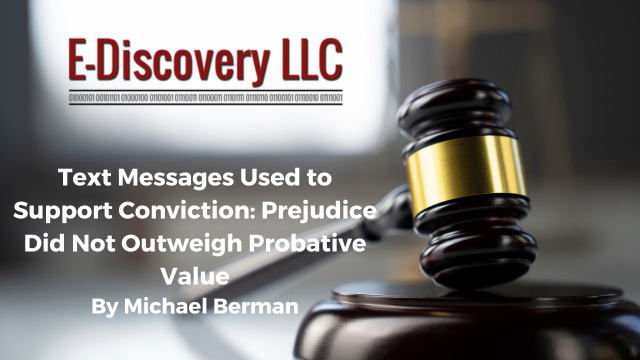
[EDRM Editor’s Note: The opinions and positions are those of Michael Berman.]
In Francois v. State, 2023 WL 8265659, at *1 (Apl. Ct. Md. Nov. 30, 2023), the defendant was charged with various offenses that included possession of a firearm and ammunition after a disqualifying conviction. On appeal, the defendant challenged the lower court’s admission of text messages relating to otherwise lawful trips to a shooting range. The Appellate Court of Maryland affirmed. In doing so, the Court noted that all admissible evidence is prejudicial and it defined when it is unfairly prejudicial.
This evidence was relevant. It was not admitted to show that Mr. Francois was a general scofflaw and therefore more likely to engage in the misconduct of which he was accused. It was admitted to corroborate and bolster the testimony that on a specific date and place, he possessed a handgun and ammunition.
Francois v. State, 2023 WL 8265659, at *1 (Apl. Ct. Md. Nov. 30, 2023).
THE EXCLUSION RULES
Maryland Rule 5-403 is similar to Fed.R.Evid. 403. The Maryland Rule states: “Although relevant, evidence may be excluded if its probative value is substantially outweighed by the danger of unfair prejudice, confusion of the issues, or misleading the jury, or by considerations of undue delay, waste of time, or needless presentation of cumulative evidence.”
The Federal Rule states: “The court may exclude relevant evidence if its probative value is substantially outweighed by a danger of one or more of the following: unfair prejudice, confusing the issues, misleading the jury, undue delay, wasting time, or needlessly presenting cumulative evidence.”
FACTUAL PREDICATE
The Francois Court explained:
Mr. Francois moved in limine to exclude the contents of text messages found on his cell phone after the arrest. Those messages appear to be an exchange between Mr. Francois and another individual regarding different types of firearms and their shared fondness for visiting the shooting range to try out these weapons. Under ordinary circumstances, such information would not be considered a “bad” act; shooting is a perfectly ordinary and lawful hobby. However, the parties stipulated that Mr. Francois was previously convicted of a crime which precluded him from possessing a firearm, making the text messages evidence of a crime distinct from the crimes he was charged with.
Francois v. State, 2023 WL 8265659, at *1 (Apl. Ct. Md. Nov. 30, 2023).
It does not appear that authentication was an issue: “Mr. Francois does not argue that there was not clear and convincing evidence that he had, in fact, exchanged text messages about his (unlawful) possession and use of various firearms. He argues that the motions court erred in concluding that the evidence had a special relevance beyond propensity, and abused its discretion in determining that the risk of unfair prejudice was outweighed by the probative value of the evidence.”
RELEVANCE
As to relevance, the Court reasoned in part:
The fact that Mr. Francois admitted (in the text messages) to possessing handguns just days before the incident is specially relevant to determining whether Mr. Francois possessed a handgun. Moreover, as the State notes in its brief, the ammunition the police recovered was found in a box truck that Ms. Gray (a lawful gun owner) had rented and to which she had access. Demonstrating that Mr. Francois discussed trips to the shooting range in the days and weeks prior to the incident was relevant to show that the ammunition in the truck was his, not hers. Moreover, in the text messages, Mr. Francois seems to state that he owns a .45, and .45 caliber rounds were found in the truck. This evidence was relevant. It was not admitted to show that Mr. Francois was a general scofflaw and therefore more likely to engage in the misconduct of which he was accused. It was admitted to corroborate and bolster the testimony that on a specific date and place, he possessed a handgun and ammunition.
Francois v. State, 2023 WL 8265659, at *1 (Apl. Ct. Md. Nov. 30, 2023).
After determining that the evidence was relevant, the Court moved to Rule 5-403.
PREJUDICE DID NOT OUTWEIGH PROBATIVE VALUE
The Court rejected the appellate argument that prejudice outweighed the probative value:
The evidence was prejudicial in the sense that it helped the State prove its case. That is why the State presented it. “Unfair” prejudice, in this case, means that the evidence would have tended to cause the jury to convict Mr. Francois not based on the strength of the State’s case, but because of an inflamed and irrational response to learning that Mr. Francois enjoyed visiting the firing range with a friend. Given the fairly mild nature of the evidence, the risk of unfair prejudice is slight. The court, therefore, did not abuse its discretion when determining that the probative value of the evidence outweighed the risk of unfair prejudice. Mr. Francois’s second appellate contention is denied. [emphasis added].
Francois v. State, 2023 WL 8265659, at *1 (Apl. Ct. Md. Nov. 30, 2023).
In an interesting passage, the Court wrote that: “The amount of time between the messages and the allegation of possession goes to its weight. That period could be so long that the relevance was too attenuated to overcome even a tiny risk of unfair prejudice. Here, however, the messages were between six months and six days old at the time of the incident. The relevance of the messages was not so attenuated.”
“We do not exclude relevant evidence merely because it is prejudicial, as ‘[a]ll evidence, by its nature, is prejudicial.’… Rule 5-403 instead excludes relevant evidence when its unfairly prejudicial nature substantially outweighs its probative value. Under Rule 5-403, unfair prejudice outweighs a piece of relevant evidence’s probative value if it ‘tends to have some adverse effect … beyond tending to prove the fact or issue that justified its admission.”” Woodlin v. State, 484 Md. 253, 265 (2023)(citation omitted; emphasis in original).


